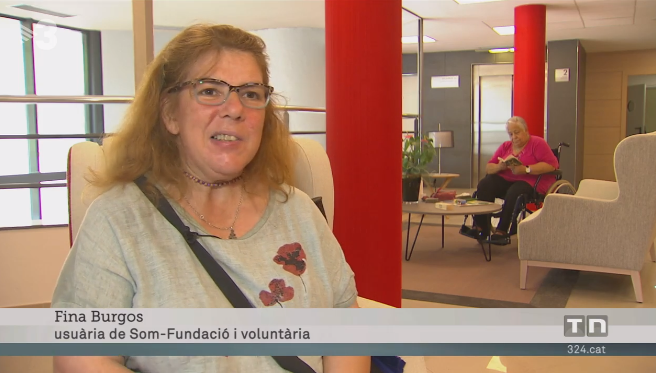#30yearsofInclusion – Inclusion Europe turns 30 in 2018!
To mark this year, we will be highlighting and celebrating inclusion in Europe in its various forms and practices – and the people behind it.
Every month we will present one person who has brought the Inclusion movement forward in Europe.
Our Inclusion Heroine in October is Fina Burgos, who lives in Barcelona.
Spending time together playing a board game or doing handwork, having a chat, simply being there: Fina Burgos, a person from our member Som -Fundació gives support to in decision-making, is part of their #ICanToo programme. She does valuable volunteer work by regularly meeting up with Mrs. Rosario, an older woman who lives in a residence close to her. We asked Fina about her motivation and her advice for others who want to become volunteers:
How did you get the idea to sign up as a volunteer?
Fernando, a friend I have gotten to know at the place where I live, had an accident and had both arms cast in a sling for a while. The educator at the residence asked if anyone can help him eat, and I offered to do it. They appreciated that I was able to help and the educator told Som-Fundació that they contacted the association Amics de la Gent Gran to see if I could volunteer there. I did an interview with Amics de la Gent Gran and I also did a training.
Four months after the training, Amics de la Gent Gran suggested that I make company to Mrs. Rosario, someone I could get along well with.
What are you doing as a volunteer?
I keep Mrs. Rosario company: We eat together, we play cards, she makes me necklaces or bracelets … And sometimes she gives me lots of kisses! – laughs
How often do you meet Mrs. Rosario?
Once a week. One day I told her that I could come more often. But since I need to take a very steep street towards the home where she lives, she did not want me to exhaust myself too much.
What do you like most about your volunteering?
That I feel alive, I feel like a person, with a desire to move forward. I feel that I can help other people be happy.
Have you ever encountered a difficult time?
One day Mrs. Rosario was very sad, even angry, about a problem with a professional from the centre where she lives. She told me about this and it affected me a lot. As I was worried, I asked the educators in my centre for advice on how I could help her. When we met again and I told her that I had asked for advice, she got very angry with me. It took a few days for her anger to pass. But in the end, it all turned out well and she appreciated the help.
Why do you think it is important to volunteer?
For me it is important because it makes me feel happy, human, like a person … When you see the smile and the happiness of a person you support, you feel that you can make a contribution … I’m lost for words!
If you had to encourage other people to volunteer, what would you tell them?
I would tell them that the person they support will value it very much. You will help this person to not feel like a piece of furniture that is bothering everyone.
But you also need to have lots of empathy to do this work! Sometimes these people value a hug more than a plate with food. Mrs. Rosario only asks for my company.
Then would you encourage other people to volunteer?
Yes, because from my experience I can say that it is very fulfilling. It makes me feel happy.
Anything else you would like to add?
We need to be more human. These people just need love and company.
Our Inclusion Hero of September was Henrique Amoedo from Portugal, who founded an inclusive dance company:
“The magic of art is exactly this: being able to reach people in different ways”
Our Inclusion Heroine of August was Maribel Cáceres, who fought to regain her right to vote:
“It is totally worth the trouble!”
Our Inclusion Hero of July was Charles, a young man from France:
“Charles – a young man challenging preconceptions”
Our Inclusion Hero of June was Hendrik Jan Menninga, a “UN ambassador”:
“We make sure that the UN CRPD is not just a piece of paper”
Our Inclusion Hero of May was Sami Helle, a musician, self-advocate and politician:
“I chose what felt good. You see: I love music!”
Our Inclusion Hero of April was Gerhard Furtner, the managing director of a company that employs people with learning disabilities:
“This type of inclusion should catch on everywhere in Europe”
Our Inclusion Heroine of March was Dana Migaliova, a mother of a son with intellectual disabilities and president of our Lithuanian member Viltis:
“Parents no longer have to hide their children”
Our Inclusion Heroine of February was Irish actress & musician Aimée Richardson:
“More roles must be written for people with intellectual disabilities!”
Our Inclusion Heroine of January was self-advocate Elisabeta Moldovan from Romania:
“I experienced a lot of abuse in institutions. I wanted to change this situation for others.”






